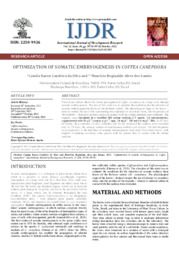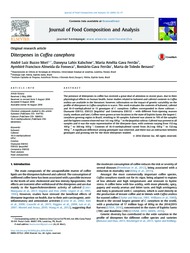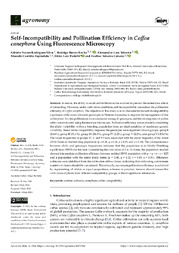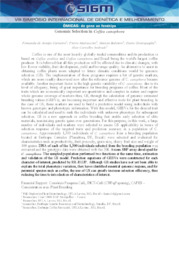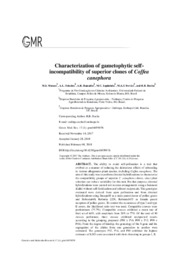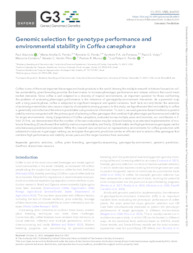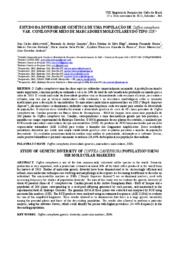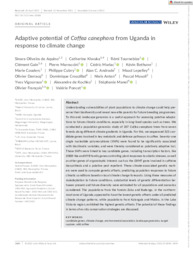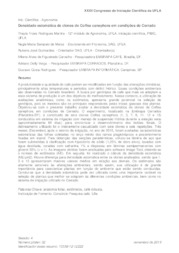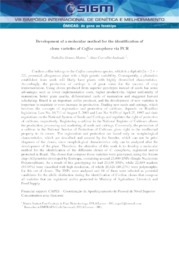Search Publications
Filter by:
| Author(s): SILVA, C. K. C. da; SANTOS, M. R. A. dos Plant tissue culture allows the clonal propagation of Coffea canephora on a large scale through somatic embryogenesis. The aim of this study was to optimize the conditions for the induction of somatic... ... |
| Author(s): MORI, A. L. B.; KALSCHNE, D. L.; FERRAO, M. A. G.; FONSECA, A. F. A. da; FERRÃO, R. G.; BENASSI, M. de T.
|
| Author(s): SILVA, A. N. R.; ROCHA, R. B.; TEIXEIRA, A. L.; ESPINDULA, M. C.; PARTELLI, F. L.; CAIXETA, E. T. In nature, the ability to avoid self-fertilization has evolved to prevent the deleterious effects of inbreeding. However, under cultivation conditions, self-incompatibility can reduce the pollination... ... |
| Author(s): CARNEIRO, F. de A.; MARRACCINI, P.; BALESTRE, M.; GRATTAPAGLIA, D.; ANDRADE, A. C. Coffee is one of the most heavily globally traded commodities and its production is based on Coffea arabica and Coffea canephora and Brazil being the world's largest coffee producer. It is believed th... ... |
| Author(s): MORAES, M. S.; TEIXEIRA, A. L.; RAMALHO, A. R.; ESPINDULA, M. C.; FERRAO, M. A. G.; ROCHA, R. B. The ability to avoid self-pollination is a trait that evolved as a manner of reducing the deleterious effects of inbreeding in various allogamous plant species, including Coffea canephora. The aim of... ... |
| Author(s): ADUNOLA, P.; FERRÃO, M. A. G.; FERRÃO, R. G.; FONSECA, A. F. A. da; VOLPI, P. S.; COMÉRIO, M.; VERDIN FILHO, A. C.; MUNOZ, P. R.; FERRÃO, L. F. V. Coffee is one of the most important beverages and trade products in the world. Among the multiple research initiatives focused on coffee sustainability, plant breeding provides the best means to incre... ... |
| Author(s): ALEKCEVETCH, J. C.; CARNEIRO, F. de A.; RÊGO, E. C. da S.; GUERRA, A. F.; BARTHOLO, G. F.; FERRAO, M. A. G.; FONSECA, A. F. A. da; MARRACCINI, P.; ANDRADE, A. C. O Coffea canephora é uma das duas espécies cultivadas comercialmente no mundo. A produção nacional é muito importante, com uma produçao estimada a cerca de 26% do total de café beneficiado produzido n... ... |
| Author(s): AQUINO, S. O. de; KIWUKA, C.; TOURNEBIZE, R.; GAIN, C.; MARRACCINI, P.; MARIAC, C.; BETHUNE, K.; COUDERC, M.; CUBRY, P.; ANDRADE, A. C.; LEPELLEY, M.; DARRACQ, O.; CROUZILLAT, D.; ANTEN, N.; MUSOLI, P.; VIGOUROUX, Y.; KOCHKO, A. de; MANEL, S.; FRANÇOIS, O.; PONCET, V. Understanding vulnerabilities of plant populations to climate change could help preserve their biodiversity and reveal new elite parents for future breeding programmes. To this end, landscape genomics... ... |
| Author(s): MARTINS, T. F. R.; MATOS, N. M. S. de; GUIMARÃES, R. J.; CARVALHO, M. A. de F.; VEIGA, A. D.; RODRIGUES, G. C. A produtividade e qualidade do café podem ser modificadas em função das alterações climáticas, principalmente altas temperaturas e períodos com déficit hídrico. Essas condições ambientais são observad... ... |
| Author(s): MATTOS, N. G.; ANDRADE, A. C. Conilon coffee belongs to the Coffea canephora species, which is a diploid (2n = 2 × = 22), perennial, allogamous plant with a high genetic variability. Consequently, a plantation established from see... ... |
Observation
Some of Embrapa's publications are published as ePub files. To read them, use or download one of the following free software options to your computer or mobile device. Android: Google Play Books; IOS: iBooks; Windows and Linux: Calibre.
Access other publications
Access the Agricultural Research Database (BDPA) to consult Embrapa's full library collection and records.
Visit Embrapa Bookstore to purchase books and other publications sold by Embrapa.

